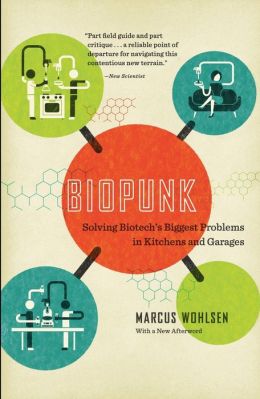Biopunk:
DIY Scientists Hack the Software of Life
Marcus Wohlsen`````````
Penguin Group (USA)
Want to give yourself chlorophyll skin? or to test your dad for dangerous diseases? Do you want the poor to have access to higher quality medical care? Are you a Do-It-Yourself [DIY] kinda guy? This may be the book for you.
Author Marcus Wohlsen calls the science behind Biopunk: DIY Scientists Hack the Software of Life "not new science, but new ways of doing science." Convincingly and compellingly told, this narrative introduces us to several bio-hackers, many who not only challenge the academic/corporate status quo but want to make positive change in the world.
Kay Aull, whose father had hemochromatosis, wanted to know if she had the same genetic disease and developed her own test, using materials she bought off Ebay. Mackenzie Cowell, after inheriting a $20,000 trust fund, bought $12,500 biotech equipment on auction, worth much more. He opened a wet lab to the community. Other biopunks, like Bryan Bishop, are transhumanists who view the mind and body's DNA as software to hack and mold to their whims.
Margaret Patterson, jill-of-all-trades, came biology hacking through writing, linguistics, software engineering and SF (I critiqued a few of her works back in the day). She is now a major activist for biology hacking and is cooking up cheaper ways of delivering simple genetic tests. She came up with the Biopunk Manifesto:
"Scientific literacy empowers everyone who possesses it to be active contributors to their own health care, the quality of their food, water, and air, their very interactions with their own bodies and the complex world around them."Marcus Wohlsen constantly draws parallels between biopunk and internet 2.0, that the two are conflatable.
In Venezuela, Guido Nunez-Mujica labors to brings cheaper high-tech healthcare to his country, with lab kits to test Chagas disease, sleeping sickness. DNA amplification became cheaper and easier with the LavaAmp. Tito Jankowski has made his OpenPCR to build kits for anyone interested, using the open-source Linux software as inspiration.
While the debate of genetically modified crops rages, India prevented crop collapse using a [stolen from Monsanto?] GM crop resistant to an organism, which they then modified further. Andrew Hessel argues to open up DNA and solve too-long mystery diseases like cancer because drug companies are too slow at developing new products.
Some like John Schloendorn want to cure death itself. BioCurious labs, nonprofit, sprung up to allow bio inventors to tinker and to claim their work as their own--a problem with large businesses, where inventions belong only to the businesses. They suspect such ventures will expand invention and innovation.
Genetic technology has been used to solve long-unsolved crimes. Direct-to-consumer companies have started up to give people knowledge of their genome and their susceptibility to diseases although some controversy arose regarding some companies' practices. Even totally new organisms have been synthesized, albeit based on other organisms.
Wohlsen closes with the risks of genetic manipulation, such as the possibility of unleaashing a superbug. He touches on nanotechnolgy, living organisms working as tiny machines. His closing argument reiterates themes touched on earlier.
Biopunk? I loved it.
Regular folks, endowed with a passion for genetic manipulation, try to
make the world a better place. They’re
like ordinary superheroes. I am well aware
of potential risks and not all of Wohlsen's analogies held water, but complaining about genetic tinkering like telling
a wide-eyed boy walking out of Star Wars (1977) for the first time and
complaining, “Lasers don’t make sounds in space.” The boy might say, “Really? That’s cool.
But... so what?” It’s missing the
forest for the trees.
Marcus Wohlsen points out predecessors. Farmers cross-bred animals for better products. Gregor Mendel, the first biopunk, who discovered genetics did so on his own, outside academia. Nobel-Prize winner, Kary Mullis, lamented that chemistry high school labs are no longer open to unsupervised student experiments: "No one got hurt and no law suits resulted." Even "Watson and Crick's approach... was more akin to tinkering than the work of an engineer or architect." In other words, Wohlsen suggests that anyone can do "biopunk." The term itself harkens back to cyberpunk and the ease of hacking brought about the value of information security. However, DNA does not code directly for certain actions but, rather, for proteins which do so sloppily. Proteins flood and dampen as needed. Splicing DNA does not always ensure specificity but sometimes plugs DNA where it's not wanted.
Does Wohlsen downplay the risks? Possibly, but all biology takes risks, and it's heartening to read of so many dedicated to doing good biology for the benefit of many. Biopunk logs this progress up to now, thrilling science enthusiasts about the future.


No comments:
Post a Comment